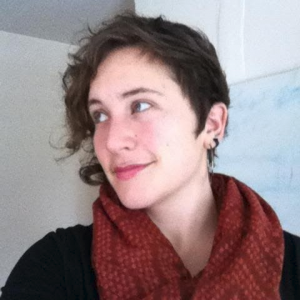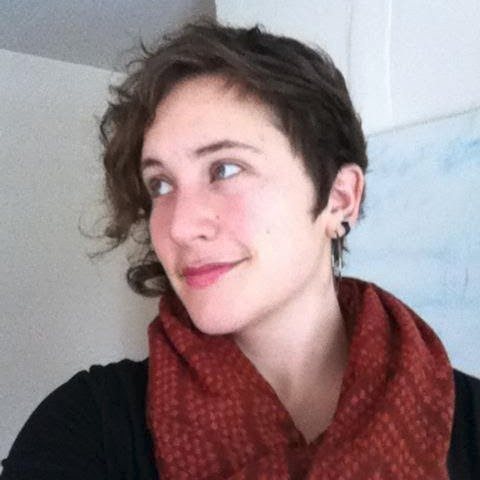Ilana Lerman
 I am connected to Jewish Voice for Peace (JVP) and IfNotNow, which bring Schwarz’s proposals to life, although the trends he outlines are ancient, central elements throughout Jewish history. JVP and IfNotNow serve and embolden a new kind of hybrid/anti- ‘Tribal’ Jew: people who love being Jewish; who celebrate Ashkenazi, Sephardi, Mizrachi, and mixed ethnicities; battle assimilation through exposing the forces of white supremacy and capitalism; find deep meaning in Jewish ancestry, history, culture, and religion; and who build Jewish groups and initiatives. And. These Jews have a strong affinity with the Palestinian struggle for freedom and also value working in solidarity with non-Jews. This kind of Jew is growing and finding home, home that has interdependent relationships between chochma, tzedek, kehillah, and kedusha.
I am connected to Jewish Voice for Peace (JVP) and IfNotNow, which bring Schwarz’s proposals to life, although the trends he outlines are ancient, central elements throughout Jewish history. JVP and IfNotNow serve and embolden a new kind of hybrid/anti- ‘Tribal’ Jew: people who love being Jewish; who celebrate Ashkenazi, Sephardi, Mizrachi, and mixed ethnicities; battle assimilation through exposing the forces of white supremacy and capitalism; find deep meaning in Jewish ancestry, history, culture, and religion; and who build Jewish groups and initiatives. And. These Jews have a strong affinity with the Palestinian struggle for freedom and also value working in solidarity with non-Jews. This kind of Jew is growing and finding home, home that has interdependent relationships between chochma, tzedek, kehillah, and kedusha.
Chochma consistently evolves and connects activists to their spirits, to their comrades and communities and brings political action to life. Chochma can be felt when an IfNotNow leader holds up their kiddush cup, spilling wine into the streets chanting the current day plagues – while their friend next to them risks arrest in support of ending the occupation. Chochma happens when rabbis on the JVP Rabbinical Council offer one-on-one pastoral care to members during the Fall Uprising in Israel/Palestine, as well as to LGBTQ members after the Orlando Massacre. Chochma occurs during a lay-led, 49-night series of counting the omer with the sefirah of tiferet equating with intersectionality. Chochma is this summer’s JVP Jewish silent meditation retreat for activists co-sponsored by the Awakened Heart Project. It is the tradition of asking questions, which keeps us awake and curious, flexible and agitational. It also keeps us asking – what are today’s idols?
Tzedek is a pathway to a purposeful, interdependent life. When people are angry by the brokenness around them and unite with each other to organize in a powerful strategy – winning is one of the most kedusha/kehillah moments. Failing together, learning, and then picking each other up can be equally, if not more kedusha/kehillah. Most of the social justice issues we care about are present and intersect in the fight for Palestinian human rights. The Islamophobia and racism generated in Palestine, used to separate Jews and Muslims and create fear, is also palpable here in the US – vilifying communities of color, immigrants, and Muslims. JVP supports the Network Against Islamophobia, which organizes against Islamophobia and anti-Arab racism and is a partner to the broader, Muslim-led movement against Islamophobia. JVP follows the calls from the most impacted and fights where we can make the most impact ourselves. Therefore we follow and endorses the non-violent call from Palestinian civil society for Boycott, Divestment, and Sanctions (BDS).
Kehilla is the precious base from which all else can thrive. JVP is holding its National Member Meeting with almost 1,000 members coming to learn, pray, sing, and strategize together. This will be one of the first times that leaders from seven independent non-Zionist minyanim will be able to meet in person after launching a new, cross-country network. Each havurah has a different structure and culture, but all have the same desire to build holy community around the sacred and the political. Throughout the year, JVP’s 65 chapters are a locus of kehilla, sometimes as members’ only Jewish affiliation.
And finally kedusha- felt in the middle of protests thousands strong, in the “aha!” moments of strategy meetings, in the depths of true relationships, in beautiful solidarity with Palestinians, in prayer spaces and in verdicts of city council hearings that divest from unethical corporations. Kedusha happens when one can taste a glimmer of a more just world. The profundity of kedusha brings kiruv, an element of bringing closer. This year JVP offered live-streamed High Holiday services from congregations connected to our Rabbinical Council. Over 600 people tuned in from all over the world. Gratitude poured in from people who did not have other prayer options because of politics, accessibility, disability, geography, or fear. Some people became new members instantly, others requested the recordings to listen to after shul and one JVP leader told me that it awoke a hunger in her for more – so she asked her chapter to start a monthly shabbat gathering/service and they said, “yes”.
What of our work is outside of Schwarz’s propositions?
Where is the centering of Jews of Color, Sephardi, Mizrachi, Mixed heritage, Queer, differently-abled, poor and working class Jews? Both JVP and IfNotNow are striving to notice the normalization of the Ashkenazi, straight, and upwardly mobile experiences, question it and evolve to be better listeners to the leadership of marginalized constituencies.
Where is the internal work on anti-semitism, and the teaching of our allies about it so we can all be more powerful together? How has the anti-semitism of the past become internalized in the generations that may not have experienced similar violence and poverty first hand, but remain connected and embodied by the survival tactics that were once so crucial? How does anti-semitism from the left and right hurt our organizing and community building and solidarity work? Both JVP and IfNotNow are finding ways to generate and discover the impact of anti-semitism, the interconnections with other oppressions, and to distinguish between anti-Zionism and anti-semitism.
Where do we see G!d explicitly in these proposals? Our texts and prayers persistently synch us back to G?d’s oneness. Institutions build, shapeshift and fall. Nations and empires come and go. Programs affect five thousand lives and then fade away. Hashem is infinite and Judaism has developed spiritual technologies to hold people together in this idea — paired with ethics, values and community structures — which can all bend toward goodness. Celebrating a diaspora Judaism, JVP and IfNotNow members hungrily search texts and prayers for meaning, nourishment, and answers.
I am excited to play with the incredible people assembled for the NPSCI Consultation, all of us teachers and learners. I am ready to find creative ways to think expansively about this political moment and WHY these questions matter.
Ilana Lerman is the rabbinical council organizer for Jewish Voice for Peace and was a core member of the two-year strategy team responsible for launching the IfNotNow movement to end Jewish American support for the occupation. She organized in interfaith settings for five years with the Boston Jewish Community Relations Council and is an alumna of Adamah, JOIN, Shefa Gold’s Kol Zimrah chanting program, and is a current co-leader of Let My People Sing! traveling Jewish singing retreats.
Is this post useful and interesting? Please consider sharing it with your social networks, and leave a comment below telling us your thoughts!

